2017年春季牛津上海(本地版)五四制七年级英语下册1.1、Writing、a、travel、guide教学设计
牛津上海版七年级英语下册知识点
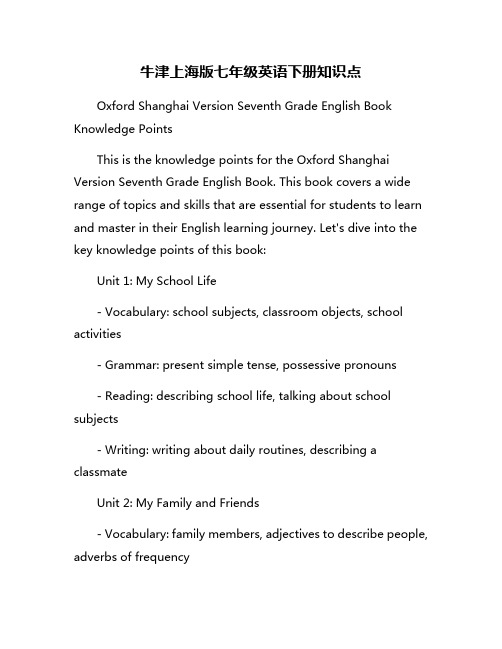
牛津上海版七年级英语下册知识点Oxford Shanghai Version Seventh Grade English Book Knowledge PointsThis is the knowledge points for the Oxford Shanghai Version Seventh Grade English Book. This book covers a wide range of topics and skills that are essential for students to learn and master in their English learning journey. Let's dive into the key knowledge points of this book:Unit 1: My School Life- Vocabulary: school subjects, classroom objects, school activities- Grammar: present simple tense, possessive pronouns- Reading: describing school life, talking about school subjects- Writing: writing about daily routines, describing a classmateUnit 2: My Family and Friends- Vocabulary: family members, adjectives to describe people, adverbs of frequency- Grammar: simple present tense, prepositions of place- Reading: introducing family and friends, talking about likes and dislikes- Writing: writing a short paragraph about family members, describing a friendUnit 3: My Free Time- Vocabulary: hobbies and leisure activities, sports and games, time expressions- Grammar: present continuous tense, future forms- Reading: talking about free time activities, discussing plans for the weekend- Writing: writing a short text about weekend plans, describing a favorite hobbyUnit 4: My Daily Routine- Vocabulary: daily activities, time expressions, food and drinks- Grammar: present continuous tense, imperatives- Reading: describing daily routines, talking about meal times- Writing: writing a short paragraph about daily routines, describing a mealUnit 5: My Home Town- Vocabulary: places in town, directions, landmarks- Grammar: there is/there are, past simple tense- Reading: describing a home town, giving directions- Writing: writing a short text about favorite places in town, giving directions to a landmarkUnit 6: My Travels- Vocabulary: modes of transport, holiday destinations, travel experiences- Grammar: present perfect tense, past continuous tense- Reading: talking about travel experiences, discussing favorite holiday destinations- Writing: writing a travel diary entry, describing a memorable journeyIn addition to these key knowledge points, the book also includes language skills practice activities, listening exercises, and speaking tasks to help students improve their English skillsin all areas. By mastering the knowledge points in this book, students will be well-equipped to communicate effectively in English and expand their language abilities.Overall, the Oxford Shanghai Version Seventh Grade English Book offers a comprehensive guide to learning English at a beginner level, covering essential topics and skills that will help students build a strong foundation in the language. With engaging activities and clear explanations, this book is a valuable resource for students looking to improve their English proficiency.。
牛津上海版七年级下册英语Module 1 Unit 4同步验收练习(附答案)

牛津上海版七年级下册英语Module 1 Unit 4同步验收练习(附答案)Module 1 Unit 4 同步验收练习Vocabulary and Grammar (共35分)I. Choose the best answer. (20分)( ) 1. His grandma is _________ old teacher. Everybody likes her.A. theB. anC. /D. a( ) 2. Are you free _________ Sunday morning?A. onB. inC. atD. /( ) 3. This is his bag. _________ is on that desk.A. MeB. IC. MyD. Mine( ) 4. Do you have the sweater _________ my size?A. ofB. inC. onD. for( ) 5. The shirt _________ long sleeves fits me well.A. hasB. ofC. onD. with( ) 6. This pair of jeans _________ too long. Can you show me a shorter pair?A. areB. isC. wasD. were( ) 7. Your new T-shirt is so beautiful. _________ and let me have a look.A. Try on itB. Try up itC. Try it onD. Try it up( ) 8. The twins want to buy a beautiful skirt _________ their mother.A. forB. toC. withD. of( ) 9. Which one do you _________, the red dress or the yellow one?A. like bestB. preferC. likeD. miss( ) 10. Watch carefully, and I will teach you _________ to make a salad.A. whatB. whichC. howD. who( ) 11. I know ______ of these two stories. Can you tell me something about them?A. noneB. allC. bothD. neither( ) 12. We _________ for him at the gate any longer.A. needn’t to waitB. don’t need waitC. don’t need to waitD. needn’t waiting( ) 13. Please come to my home and help me with my English tonight. The underlined word means _________.A. this eveningB. next eveningC. last nightD. tomorrow( ) 14. Would you like _________ shopping with me this Saturday?A. goB. goingC. to goD. goes( ) 15. Henry has worked as a fireman _________ 1970.A. forB. sinceC. inD. from( ) 16. If it _________ next week, we will go for an outing.A. doesn’t rainB. rainsC. won’t rainD. will rain( ) 17. —Fred wants to take a bus to Sheshan State Resort.—_________A. Neither do Bill.B. So do Bill.C. So does Bill.D. Neither does Bill.( ) 18. Jason _________ all his pocket money yet.A. didn’t spendB. doesn’t spendC. don’t spendD. hasn’t spent( ) 19. —_________, can you tell me how to get to Nanjing Road Walkway?—You can take the No. 20 bus.A. Excuse meB. SorryC. HelloD. Please( ) 20. —Can I have a cup of coffee, please?—_________A. No, you can’t.B. Thank you.C. It’s a pleasure.D. Certainly.II. Complete the sentences with the given words in their proper forms. (5分)1. The _________ (watch) in the shop are very beautiful.2. Look, the _________ (change) room is over there.3. I cooked lunch by _________ (I) because my mother was ill.4. I like eating rice dumplings. I think they are very _________ (taste).5. Linda’s new home is on the _________ (twelve) floor.III. Rewrite the following sentences as required. (10分)1. She needs something for her party. (改为一般疑问句)_________ she need _________ for her party?2. Jenny will see her grandparents this weekend. (改为否定句)Jenny _________ _________ her grandparents this weekend.3. The boy next to the door is the best student in our class. (对划线部分提问)_________ _________ is the best student in your class?4. Let’s come into the meeting room. (改为反意疑问句)Let’s come into the meeting room, _________ _________?5. That TV programme is very interesting. (改为感叹句)_________ _________ interesting TV programme it is!Reading and Writing (共40分)I. Reading comprehension. (30分)ADear Jane,My English name is Jack. I’m from China. Mr Wang, my English teacher, told me your name and e-mail address. I’m glad to write to you. Would you like to be my pen friend?What do you usually do after school? When I am free, I always play sports. I also like watching TV. I’d like to tell you what I think of TV shows. I love English now. It helps me a lot! SoI watch English programmes very often. I also like sports news. But I don’t like soap operas (肥皂剧). I think they are boring (乏味的). I don’t like Chinese Cooking, either. I think it’s for Mums!Jane, what do you think of TV shows? Can you write to me and tell me about your ideas?Best wishes.Yours,JackTrue or false. (5分)( ) 1. Mr. Wang is Jane’s English teacher.( ) 2. Jack always plays sports when he is free.( ) 3. Jack tells Jane about his favourite subject, Maths in the letter.( ) 4. Jack likes English programmes and sports news.( ) 5. This is the second time for Jack to write to Jane.BEvery morning a rich man found a poor man sitting on a bench (长凳)in a park. The poor man always sat there, looking at a big hotel. The rich man owned (拥有) the hotel. One day the rich man went out of his car and said to the poor man, “Excuse me, but I just want to know why you sit here and look at my hotel every morning.”“Sir,”said the poor man, “I have no money, no family and no home. I sleep on this bench, and every night I dream that one day I’ll sleep in that hotel.”The rich man said, “Tonight your dream will come true. You can live in the hotel for free.”A few days later, the rich man went to see the poor man. To his surprise, he found that the poor man had moved out of the hotel, back to his bench. The poor man said, “You see, when I was down here sleeping on my bench, I dreamt I was up there, in that big hotel. But when I was up there, I dreamt that I was back to this cold bench. It was a terrible(可怕的)dream, and I couldn’t fall asleep at all.”Choose the best answer. (5分)( ) 1. The poor man lived in _________ before he met the rich man.A. a hotelB. his homeC. a parkD. a car( ) 2. Every morning, the poor man sat on the bench and _________.A. waited for the rich manB. looked at the rich man’s carC. looked at the rich man’s hotelD. enjoyed the clean air( ) 3. Every night the poor man dreamt of _________ before he lived in the hotel.A. sleeping in that hotelB. owning that hotelC. becoming richD. being the rich man’s friend( ) 4. The poor man moved out of the hotel because _________.A. he didn’t want to live in such a fine roomB. he didn’t like the rich manC. he couldn’t pay for the roomD. he couldn’t fall asleep at all there( ) 5. Finally, the poor man found it _________ to sleep in that hotel.A. sorryB. terribleC. wonderfulD. niceCLast summer I went to Taiwan with my parents. Taiwan is really beautiful! The weather there is always warm and wet because Taiwan is surrounded (包围) by the sea. In the north, there is the winter season, but in the south, there is no winter season and you can enjoy warm weather every day.There are many mountains in Taiwan. A-li Mountain is one of the five biggest mountains there. We went to climb A-li Mountain one afternoon. There are many trees there.Sun Moon Lake is the largest natural lake in Taiwan. In the lake there are many kinds of fishes. When we were watching the fish, an old man asked us, “Are you from Shanghai?” When we said “yes”, he looked very happy and told us he was born in Shanghai and he missed the city very much. He asked us a lot of questions about Shanghai and gave us some fish when we left.Answer the questions. (5分)1. Who did the writer travel to Taiwan with?______________________________________________________2. How is the weather in Taiwan?______________________________________________________3. Which mountain did the writer climb one afternoon?______________________________________________________4. Where was the old man born?______________________________________________________5. What do you think of Taiwan?______________________________________________________DChoose the words or expressions and complete the passage. (5分)One cold morning, an old woman went to see her doctor. She ___1___ him that her right leg hurt, and sometimes she could not walk. She asked him what was ___2___ because she had never got such feeling before.The doctor looked over her ___3___, then he said, “You are in good health. I think the trouble (麻烦)in your right leg is just a matter of old age. We get all ___4___ of illness (病)when we are old. The trouble almost starts in spring.”“I don’t think so, doctor.”she said. “My left leg is good, and it is ___5___ age as my right leg.”( ) 1. A. asked B. said C. told D. spoke( ) 2. A. good B. wrongC. matterD. interesting( ) 3. A. carefully B. careC. carefulD. careless( ) 4. A. reasons B. kinds C. things D. ways( ) 5. A. as B. differentC. soD. the sameERead the passage and fill in the blanks with proper words. (10分)Most American businesses are open five days a week. At American schools children attend school five days a week, too. American families u___1___ have a two-day weekend. The weekendis Saturday and Sunday. Over the weekend, people spend their time in many d___2___ ways. Many families enjoy weekends together. They may go shopping, go for a drive, or visit friends. They may also i___3___ friends to have a party at home. Many American families take part in sports. Running, cycling, playing volleyball and swimming are popular in summer. Skiing and skating are the favourite w___4___ sports. Weekends are also a time for American families to work in their yards or in their houses. Many families p___5___ flowers and have vegetable gardens. For most Americans, weekends are very busy.1. _________2. _________3. _________4. _________5. _________II. Writing. (10分)Write at least 60 words about the topic “Going Shopping”.Suggestions:1. When and where are you going shopping?2. What do you need?3. Why do you need these things?Going Shopping________________________________________________________________________________________________________________________________ 12________________________________________________________________________________________________________________________________ 24________________________________________________________________________________________________________________________________ 36________________________________________________________________________________________________________________________________ 48________________________________________________________________________________________________________________________________ 60【答案】:Vocabulary and Grammar:I. 1—5 BADBD 6—10 BCABC 11—15 DCACB 16—20 ACDADII. 1. watches 2. changing 3. myself 4. tasty 5. twelfthIII. 1. Does, anything 2. won’t see 3. Which boy 4. shall we 5. What anReading and Writing:I. A. 1—5 FTFTFB. 1—5 CCADBC. 1. His / Her parents.2. The weather there is always warm and wet.3. A-li Mountain.4. In Shanghai.5. It’s very beautiful. (Any reasonable answer is OK.)D. 1—5 CBABDE. 1. usually 2. different 3. invite 4. winter 5. plantII. One possible version:Going ShoppingI am going shopping with my mother this Sunday. We want to go to Lianhua Supermarket because it is very big. We can buy many different things there. I need a new pair of jeans because my old pair is too short. We haven’t got much food at home, so my mother needs to buy some. She also wants to buy a sweater with the V-neck for my father because it is getting colder. I think we will have a good time at the supermarket.。
2017年春季牛津上海(本地版)五四制七年级英语下册3.9、The、wind、is、blowing教学设计

Unit 9 The wind is blowing1教学目标Guide the Ss to practise the following structure with some pictures:T: What can we see when the wind blows ?S: We can see… when…2. Guide the Ss to learn the text with some pictures and by doing listening exercise.3. Encourage the Ss to create a poem about the wind like the text.2学情分析students are able to talk about their favorite seasons and know how to describe ac tivities in different weather. students are active in class and they are interested in discussing .3重点难点Guide the Ss to learn the text with some pictures and by doing listening exercise. Encourage the Ss to create a poem about the wind like the text.4教学过程第一学时教学活动活动1【导入】lead-inPre-task preparation1. Play a guessing game with the S to lead in the topic of this text:Mr WindMr SunWhen it blows,Leaves flyFrom the treesAcross the sky.When it blows,Kites flyRising and divingHigh in the sky.When it shines,People sweatAnd go swimmingIn the sea.When it shines,Bees and butterfliesDance happilyAmong the flowers.2. T: Tell the Ss. When we are writing a story, we usually use simple past tense.Then guide the Ss to review past form of some regular or irregular verbs in thistext.活动2【讲授】while-taskDisplay a picture of Mr Sun and Mr Wind. Then ask the Ss some questions about the picture:l What can you see in the picture ?l Which weather do you like better, sunny or windy?l Can you guess who is stronger, Mr Sun or Mr Wind ?2. Play a video about the story between Mr Sun and Mr Wind. Then ask the Ss t o do some T/ Fquestions:l Mr Wind and Mr Sun had a competition. ( T )l Mr Sun got the man’s coat off. ( T )l Mr Wind got the man’s coat off, too. ( F )l Mr Wind was stronger. ( F )1. Ask the Ss to read and arrange the text by themselves according to the above video活动3【讲授】while-taskAsk the Ss to read the whole text after the recorder.5. Ask the Ss some questions:l What kind of person was Mr Wind ? ( He was very proud.)l Why did Mr Wind and Mr Sun have a competition ?( To find out who was stronger.)6. Ask the Ss to read the whole text again. Then finish the following table to see what Mr Sun7. Ask the Ss to read the whole text once more. Then ask and answer the followi ng questions in pairs:活动4【活动】post-taskAsk the Ss to fill in the following table according to the text with their booksclosed:2. Ask the Ss to retell the text according to the above text. 活动5【作业】homework1. Copy the phrases:2. Read and recite the text.。
七年级英语下学期期中试题 牛津上海版五四制
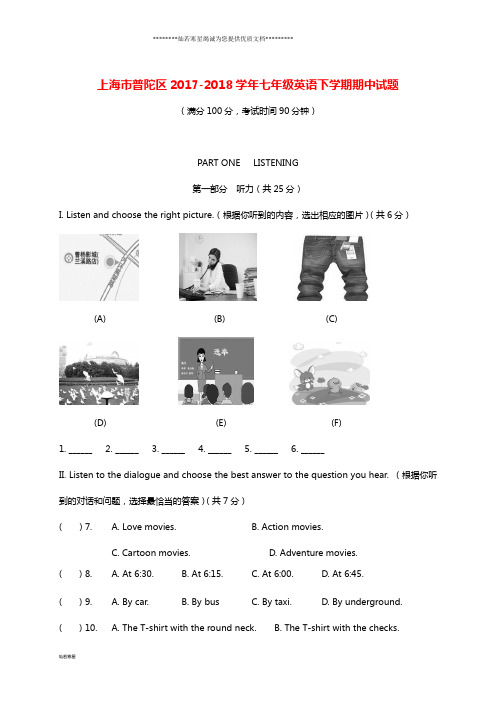
上海市普陀区2017-2018学年七年级英语下学期期中试题(满分100分,考试时间90分钟)PART ONE LISTENING第一部分听力(共25分)I. Listen and choose the right picture.(根据你听到的内容,选出相应的图片)(共6分)(A)(B) (C)(D) (E) (F)1. ______2. ______3. ______4. ______5. ______6. ______II. Listen to the dialogue and choose the best answer to the question you hear. (根据你听到的对话和问题,选择最恰当的答案)(共7分)( ) 7. A. Love movies. B. Action movies.C. Cartoon movies.D. Adventure movies.( ) 8. A. At 6:30. B. At 6:15. C. At 6:00. D. At 6:45.( ) 9. A. By car. B. By bus C. By taxi. D. By underground. ( ) 10. A. The T-shirt with the round neck. B. The T-shirt with the checks.C. The T-shirt with spots .D. The T-shirt with the V-neck.( ) 11. A. Mary. B. Peter C. Mike. D. Bob( ) 12. A. Because he has had enough.B. Because he has had much water.C. Because he doesn’t like the chocolate cake.D. Because he likes to have some chocolate.( ) 13. A. In a bookshop. B. In a library.C. In a post office.D. In a park.III. Listen to the passage and tell whether the following statements are true or false.(判断下列句子是否符合你听到的短文内容,符合的用“T”表示,不符合的用“F”表示)(共6分)( ) 14. One night, Joe was watching TV while his dog was sleeping at his feet.( ) 15. Joe lost his job, but he didn’t feel sad.( ) 16. When Joe decided to go to bed, he forgot to put out the fire.( ) 17. Joe saw smoke coming out of the kitchen.( ) 18. Joe left the room with Max quickly and asked the firemen for help.( ) 19. Joe learned that everything would be all right in the end.IV. Listen to the passage and complete the sentences.(根据你听到的短文,完成下列内容,每空格限填一词)(共6分)20.Dick had to get two jobs during his summer holidays to make enough money to________ ________ his studies.21.In the hospital, Dick was allowed to do some ________ ________.22.When the women saw Dick, she ________ ________, “No! No! I won’t go to the meatshop.”PART TWO VOCABULARY AND GRAMMAR第二部分词汇和语法(共44分)V. Choose the proper word or phrase to complete the sentence. (选择正确的单词或词组,完成下列句子。
牛津沪教版英语七年级下重点知识复习
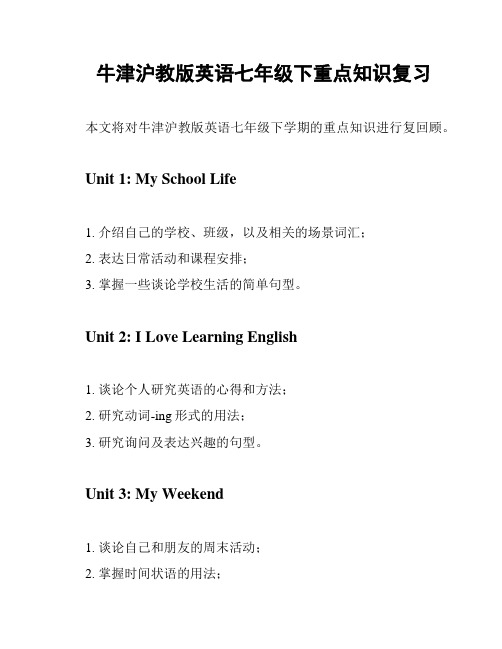
牛津沪教版英语七年级下重点知识复习
本文将对牛津沪教版英语七年级下学期的重点知识进行复回顾。
Unit 1: My School Life
1. 介绍自己的学校、班级,以及相关的场景词汇;
2. 表达日常活动和课程安排;
3. 掌握一些谈论学校生活的简单句型。
Unit 2: I Love Learning English
1. 谈论个人研究英语的心得和方法;
2. 研究动词-ing形式的用法;
3. 研究询问及表达兴趣的句型。
Unit 3: My Weekend
1. 谈论自己和朋友的周末活动;
2. 掌握时间状语的用法;
3. 掌握一些听力技巧。
Unit 4: Jobs
1. 研究表示职业的词汇;
2. 表达及询问个人志愿和理想。
Unit 5: Food and Drink
1. 研究食物和饮品的词汇;
2. 掌握询问及表述食物喜好和不喜好的方法。
Unit 6: Sports and Hobbies
1. 研究表示不同体育项目和爱好的单词;
2. 表达及询问个人感受和喜好。
Unit 7: Travelling
1. 谈论旅游的相关话题;
2. 表达和询问喜欢或不喜欢旅游的理由和偏好。
Unit 8: Festivals and Celebrations
1. 研究表示节日和庆祝活动的单词;
2. 谈论家庭或朋友间的庆祝活动。
总结
以上是牛津沪教版英语七年级下学期的重点知识复习,希望对大家的英语学习有所帮助。
沪教牛津英语 七年级下册各个单元英语范文

沪教牛津英语七年级下册各个单元英语范文Unit 1: School LifeIn this unit, we talked about our school life. Students discussed about their daily school routines, extracurricular activities, and school subjects. They also wrote essays about their favorite subject and why they enjoy it. In my essay, I talked about how much I love English class because it helps me improve my language skills and communication abilities.Unit 2: HobbiesIn Unit 2, students shared their favorite hobbies and interests with each other. They discussed why they enjoy certain activities and how it helps them relax and unwind. I wrote an essay about my love for playing the guitar and how it allows me to express my creativity and emotions. I included details about how long I have been playing, my favorite songs to play, and why I find it so fulfilling.Unit 3: Family and FriendsThis unit focused on the importance of family and friends in our lives. Students wrote essays about their family members and friends, describing their relationships and how they support each other. I wrote about my best friend and how their friendship hasimpacted me positively. I included stories of our adventures together, funny moments we shared, and how they are always there for me when I need support.Unit 4: TravelIn Unit 4, students discussed their dream travel destinations and experiences. They wrote essays about their favorite trips and why they want to visit certain places. I shared my desire to travel to Japan and experience the rich culture, delicious food, and beautiful sights. I included details about the places I want to visit, such as Kyoto, Tokyo, and Mount Fuji, and why I find Japanese culture so fascinating.Unit 5: Health and FitnessUnit 5 focused on the importance of health and fitness in our lives. Students talked about their exercise routines, healthy eating habits, and ways to stay active. I wrote an essay about my love for yoga and how it has improved my flexibility, strength, and mental well-being. I included details about my favorite yoga poses, the benefits of practicing regularly, and how it has become a crucial part of my daily routine.Unit 6: EnvironmentIn Unit 6, students discussed environmental issues and ways to protect the planet. They wrote essays about the importance of recycling, reducing waste, and conserving energy. I talked about the impact of climate change on the environment and why it is crucial for us to take action now. I included details about the consequences of global warming, ways to reduce our carbon footprint, and how we can all make a difference in protecting our planet.Overall, the topics covered in the seventh grade Oxford English textbook were diverse and engaging. Students had the opportunity to express their thoughts and opinions on various subjects, improving their language skills and communication abilities in the process. I thoroughly enjoyed writing essays on these topics and expanding my knowledge and vocabulary in English.。
牛津上海版英语七年级第二学期:Unit 1 Writing a travel guide 课件(共16张PPT)
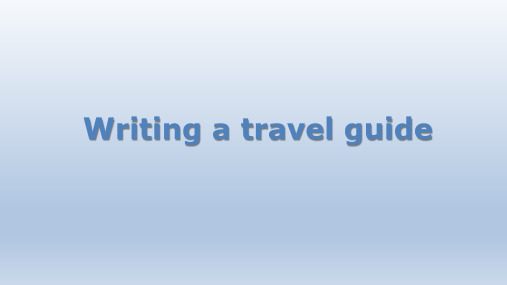
Vocabulary
Vocabulary
Vocabulary
Guide / gaɪd/
1. Noun 名词 1) 导游 hire a guide 2) 导游手册 =tourguide 3) 指南 2. Verb 动词 带领;为….领路 搭配:~sb (to...) e.g. I guided him to the chair. 我把他领到座位上去。
Vocabulary
creek /kriːk/
Small river
lake
A lake is a large area of fresh water, surrounded by land. the West Lake 西湖
paradise / ˈpærədaɪs/
As the Chinese saying goes,"In heaven there is paradise, on earth Hangzhou and Suzhou". To the Chinese, the two cities are like paradise on earth.
Vocabulary
Expressions
People’s Square 人民广场
Shanghai Botanical Gardens
Expressions
Many birds, a famous church and an observatory.
Huangpu River cruises and floating restaurants.
Expressions
Expressions
Task: Speaking
沪教牛津版七年级下册英语 Unit 5 4- Writing 教案
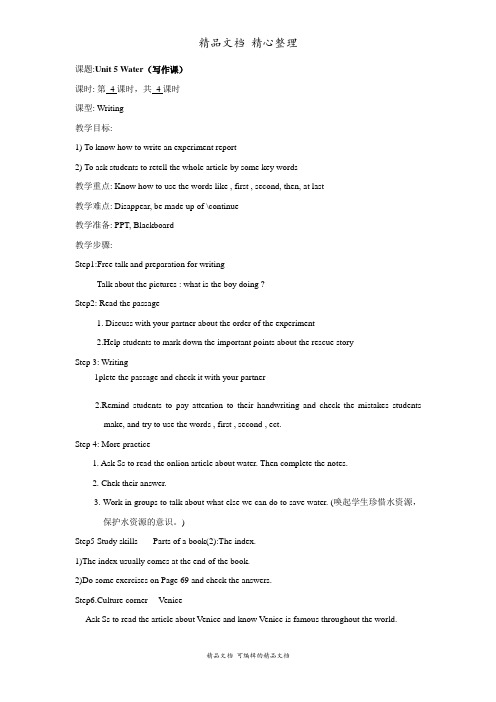
课题:Unit 5 Water(写作课)课时: 第 4 课时,共 4 课时课型: Writing教学目标:1) To know how to write an experiment report2) To ask students to retell the whole article by some key words教学重点: Know how to use the words like , first , second, then, at last教学难点: Disappear, be made up of \continue教学准备: PPT, Blackboard教学步骤:Step1:Free talk and preparation for writingTalk about the pictures : what is the boy doing ?Step2: Read the passage1. Discuss with your partner about the order of the experiment2.Help students to mark down the important points about the rescue storyStep 3: Writing1plete the passage and check it with your partner2.Remind students to pay attention to their handwriting and check the mistakes studentsmake, and try to use the words , first , second , ect.Step 4: More practice1. Ask Ss to read the onlion article about water. Then complete the notes.2. Chek their answer.3. Work in groups to talk about what else we can do to save water. (唤起学生珍惜水资源,保护水资源的意识。
- 1、下载文档前请自行甄别文档内容的完整性,平台不提供额外的编辑、内容补充、找答案等附加服务。
- 2、"仅部分预览"的文档,不可在线预览部分如存在完整性等问题,可反馈申请退款(可完整预览的文档不适用该条件!)。
- 3、如文档侵犯您的权益,请联系客服反馈,我们会尽快为您处理(人工客服工作时间:9:00-18:30)。
Unit 1 Writing a travel guide1教学目标By the end of the lesson, the Sts will…be able to further practise describing a place and know more about Shanghai.be able to develop their speaking ability of fluency by describing a scenic spot.2学情分析The learners are the students form Class Twelve, Grade Seven of North Jincai Se condary School. They have been learning English for 7 years, so they are of differ ent levels. Quite a few students are quite excellent. They do well in both speaking and writing. They are very active in class. But some students are at a lower Engli sh level. However, sometimes they can speak a little in class. What they need is a language environment. Therefore, group work in class is helpful for them to take an active part in the class.3重点难点This is ‘more practice’ part of Module One. The topic is A One-day Tour Plan. We have talked about some famous places in the previous period, so the students ha ve learned some expressions. There will be a language environment created for th em so as to encourage more of them to talk about scenic spots and their tour pla ns.Key phrases and sentence structures are familiar to students. But it will be a little hard for them to organize language with much new information. So teacher can tak e fully advantage of group work. The students may have difficulty in listening to th e French in the second part because of the accent. Teachers can give students a second chance to listen.Some students may also have difficulty in pronouncing som e words. Teachers can guide them to use the dictionaries on their Pads.4教学过程第一学时教学目标By the end of the lesson, the Sts will…be able to further practise describing a place and know more about Shanghai.be able to develop their speaking ability of fluency by describing a scenic spot.学时重点This is ‘more practice’ part of Module One. The topic is A One-day Tour Plan. We have talked about some famous places in the previous period, so the students ha ve learned some expressions. There will be a language environment created for th em so as to encourage more of them to talk about scenic spots and their tour pla ns.学时难点Key phrases and sentence structures are familiar to students. But it will be a little hard for them to organize language with much new information. So teacher can tak e fully advantage of group work. The students may have difficulty in listening to th e French in the second part because of the accent. Teachers can give students a second chance to listen.Some students may also have difficulty in pronouncing som e words. Teachers can guide them to use the dictionaries on their Pads.教学活动活动1【导入】Lead inIt’s said that they really enjoyed the tr ip to Shanghai. Do you want to know where they have been? I will show you some pictures of places they’ve been. Please ta ke notes when you are watching.T gives the following instructions:1. I will show you some pictures of places they’ve been.2. Please take notes when you are watching.3. After that, please tell me how many places are there altogether and what they are.T shows four pictures of some places.S answers according to the picture.T corrects the mistakes and may show the pictures again if necessary.(Pudong International Airport, the bund, Yu garden, Shanghai zoo, Xintiandi, Shang hai Science and Technology Museum and Shanghai Museum)活动2【活动】Input-listeningT: Among these pictures, do you know their favourite place?Students may give some answers or no answer.T: I’ve invited 4 French students to talk about their favourite places. Let’s listen to them. Please take notes while listening.T plays the recording one by one.T invites students to give answers and give reasons.T gives feedback if the students’ answers are wrong.活动3【活动】Input-readingT: French students told me that they wanted to know more about Shanghai, about those they have been to, and also about those they h aven’t. Would you please giv e them some introductions about more places? First, you need to read some instru ctions.T gives the instructions.1. Work in a group of 6.2. Each group needs to read 8 passages and find useful information as much as possible.3. Take notes and finish the table.4. Group A is responsible for sightseeing, Group B shopping and Group C eating. T provides individual drilling.活动4【活动】Output-an introduction about a scenic spotT invites some students to introduce some scenic spots according to the informatio n they have taken down.T gives feedbacks about their presentations.活动5【活动】Output-a tour planT: I think they will enjoy those places. So why not make a tour plan for them? Ple ase discuss with your group members and make a one-day tour plan for them. Ea ch group needs to focus on your task. (Group A sightseeing Group B eating Group C shopping.)T provides individual drilling.T invites some students to give presentations about their tour plans.T gives feedbacks about their presentations.活动6【作业】AssignmentT: Write down your 3-day tour plan for French students. The school may use your plan next year.e.g.: On the first day, they are going to …。
